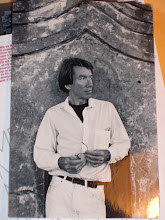Ars Poetica
A poet peels from the mind and heart
the first layer of skin,
yet does not succumb to the astonishing
ecstasies vouchsafed to him.
He can seem weak as a sick cat
and twitches at every breeze and whim,
then tough as an old vulture, rapt,
hovering, alone, above the field of the dead.
He's known failure, hatred, love,
success, defeat, power, wild
grief, overwhelming bliss,
and despair, death hungering,
and holds to none while holding all,
to find the words that, saying each,
purge them all; that carry the sun
in the heart across the torn mind,
the spirit’s ice in the soul's flames.
Clear when clarity is called for,
he flashes mind in a cry of light,
tooling like a scalpel in pain’s mesh,
and obscure when obscurity is required:
mist and cloud and fog are true,
as tears are true although they blind:
the laws of light no night obeys:
some things the day can only shame.
A poet is never too pure –
his fingers smell of rut and mud,
not just ink and old, fine books;
also of jasmine, roses, honeysuckle.
He's failed at the slow, dark work of love
and paid for his heart’s stupidities;
and also knows triumph’s pride,
the steely happiness of conquest.
He’s learned that words, like him, are not
innocent, and forgiven them –
he also knows what evils are not
forgivable, and will not forgive them.
He hasn’t forgotten the unpaid debt
that poetry owes humanity,
or turned his back altogether on
the feckless species he calls his own,
though every hour they disappoint him.
He combines heart, nerve, brain,
psyche, body, spirit, mind,
in the loom of words beneath his hand:
never failing his goal of a truth
he never may be able to attain,
as he aims his words at his reader’s heart
though he misses again – and again –
and again.
A poet peels from the mind and heart
the first layer of skin,
yet does not succumb to the astonishing
ecstasies vouchsafed to him.
He can seem weak as a sick cat
and twitches at every breeze and whim,
then tough as an old vulture, rapt,
hovering, alone, above the field of the dead.
He's known failure, hatred, love,
success, defeat, power, wild
grief, overwhelming bliss,
and despair, death hungering,
and holds to none while holding all,
to find the words that, saying each,
purge them all; that carry the sun
in the heart across the torn mind,
the spirit’s ice in the soul's flames.
Clear when clarity is called for,
he flashes mind in a cry of light,
tooling like a scalpel in pain’s mesh,
and obscure when obscurity is required:
mist and cloud and fog are true,
as tears are true although they blind:
the laws of light no night obeys:
some things the day can only shame.
A poet is never too pure –
his fingers smell of rut and mud,
not just ink and old, fine books;
also of jasmine, roses, honeysuckle.
He's failed at the slow, dark work of love
and paid for his heart’s stupidities;
and also knows triumph’s pride,
the steely happiness of conquest.
He’s learned that words, like him, are not
innocent, and forgiven them –
he also knows what evils are not
forgivable, and will not forgive them.
He hasn’t forgotten the unpaid debt
that poetry owes humanity,
or turned his back altogether on
the feckless species he calls his own,
though every hour they disappoint him.
He combines heart, nerve, brain,
psyche, body, spirit, mind,
in the loom of words beneath his hand:
never failing his goal of a truth
he never may be able to attain,
as he aims his words at his reader’s heart
though he misses again – and again –
and again.

